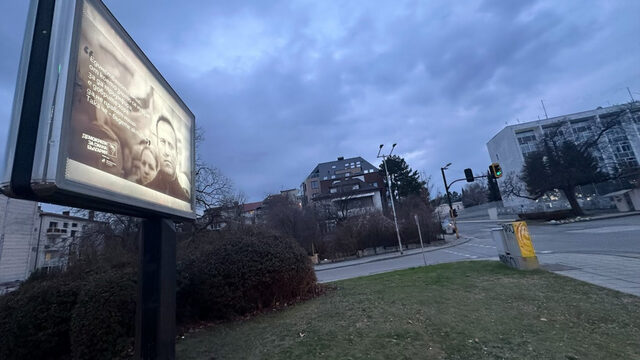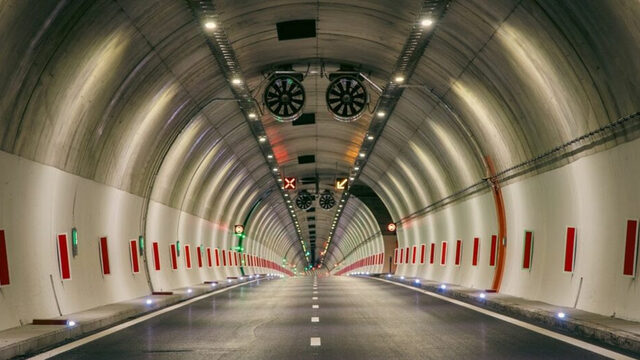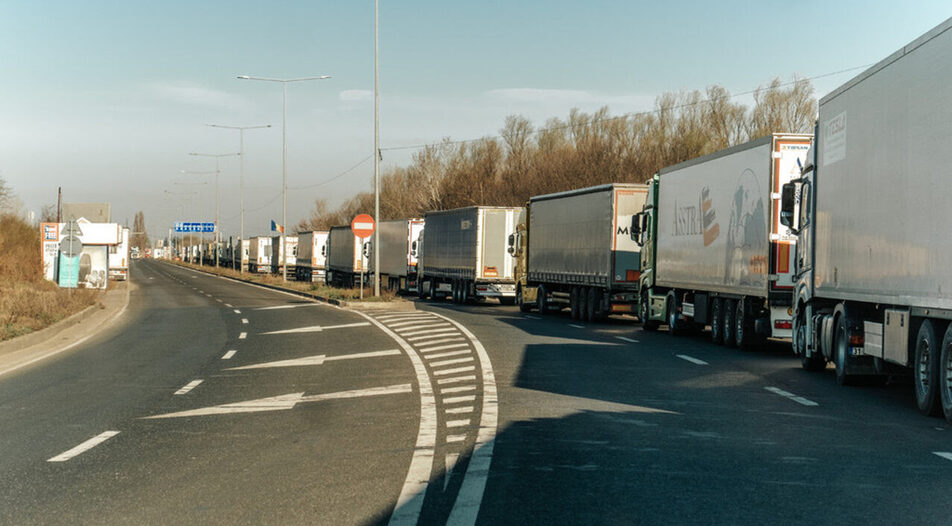Pencho Milkov is not the worst mayor in the country. There are definitely worse than him, yet the Mayor of Ruse suffers from a very widespread weakness around here - he easily backtracks on his promises and masks his true intentions with good words.
Back in 2022, Milkov said his Danube municipality planned to deal with a huge problem afflicting it: the influx of heavy trucks, lining up the streets of Ruse, waiting to pass through the nearby border with Romania. They planned to build a huge parking lot, so that the TIRs can wait there instead of blocking the roads. "This is an opportunity for years ahead. The procedure is fair and free," said the mayor at the time.
Journalists, being the cynics they are, immediately sensed foul play. They had reasons to: there was already a model like this, working on another border - the Turkish one. It was the perfect example of how one company with the right owners can totally privatize what's basically a state responsibility - to provide a parking space and control the flow of traffic through the border checks. Together with the food health checks the company was doing, another one with connections to the same shady owners was operating a brand new parking lot (and a casino).
Nothing like this will happen, stated Ruse municipality. What's more, in a reply to Capital Weekly back at the time, it said it planned to build a second parking lot, just to safeguard competition.
You've probably guessed where all this is heading. A new company "TIR Parking Ruse", registered days before the procedure, won the procurement, with an 18.2 million levs bid. Months later, new partners came in. To cut a very long story short, the newcomers are shell companies, controlled by Emil Harsev and Daniela Lazarova. Harsev has been the face of many financial schemes in the past, part of them connected to the troublesome figure of Hristoforos Amanatidis-Taki (an ex-drug lord who now lives in Dubai).He's also partner with another... person of interest, shall we call him, who controls the Turkish border parking - Razmig Chakaryan-Amy. An Amy-connected company also builds a parking on another border crossing - Lesovo.
The new owners now control the Ruse parking for 30 years. An investigation by the Anti-corruption fund showed that while the parking lot is nominally non-obligatory, the transport companies are coerced to use it through every possible means. This week, the Romanian TIR association announced publicly that its drivers are discriminated against and made to wait days for passing the border, while paying higher fees to the parking. The company, they say, operates the virtual waiting line for the border "as it sees fit". They have notified their government, as well as the European Commission and are now gearing up to fight for Bulgaria to be left outside of Schengen, if it continues to support those practices.
I guess Mr. Milkov did not know the exact extent of his initiative, although I'm prepared to bet he was pretty sure where all of this was heading. But wait, there's more. Remember the other, smaller parking, Ruse municipality promised to us 2 years ago would bring competition? It is now being built by a company with links to the one operating the bigger parking. And while the municipality of Mr. Milkov previously wanted to operate this one by itself, it obviously changed its mind last week. It now plans to lease this parking out too, claim local media. Who will benefit from this, I wonder? I think you might have an idea at this point.
This newsletter is helped by
Martin Dimitrov, Monika Varbanova, Mary Ivanova and Evgeni Ahmadzai1. Politics this week:The initial salvo came from WCC-DB, which finally proposed that their (non)coalition partners sign a document to regulate the relations in the executive and the legislature for the next nine months.
A memorandum or an ultimatum?
The document, called Memorandum for Continuing Reforms in the Fields of Effective Governance, Justice, Anti-Corruption and Security, broadly regulates the way in which the rotation of prime ministers will be carried out. It also proposes a mechanism for the selection and distribution of the members of the regulatory bodies between GERB and WCC-DB and guarantees the continuation of reforms in the judiciary and the services.
It says, among other things, that the two parties will not bring up political figures for regulatory positions and each nominee will pass a thorough background check. It singles out the Anti-Corruption Agency as a priority to fill before the new government is voted in.
The silent partner
The move seems to have taken the leadership of the Turkish MRF and GERB (which have been aligning more and more openly in recent months) by surprise, and caused a chain reaction - or rather, an overreaction - from Boyko Borissov, Mariya Gabriel and Delyan Peevski, which has the potential to blow up the ruling majority and trigger early parliamentary elections.
The non-official partners from the MRF were excluded from the memorandum, obviously in an attempt to distance WCC-DB from Peevski, as this link was hurting the coalition more and more.
Who do you think you are?
Borissov's sharp reaction, which threatened to trigger an early vote, was followed by a series of nasty comments from Peevski. "The battle is for the Anti-corruption committee and for the Prosecution service. The Oligarchy wants to control the state", said the biggest power-broker of them all, branded by the US as a "significant agent of corruption".
Step back
The reformist parties clarified that the document was not a red line to GERB, but a basis for reaching an agreement for the next nine months or even for a full governing mandate. Yet, they also expressed readiness to go to an early vote in June, alongside the EU elections.
So, an early vote? Not so fast.
While it is true that the "assemblage" is shaking more than usual, we should hold our horses in predicting an early vote just yet. Borissov has a long track record of changing his mind to 180 degrees in 24 hours. WCC-DB have flexed their muscles before, but they know quite well they will lose from an early vote.
An ally not in a hurry
Do you remember when Defense Minister Todor Tagarev victoriously showed the loading of the old gendarmerie lightly armored vehicles (APCs), which were bound for Ukraine three weeks ago? Well, it turned out that they got as far as the loading platforms and never actually left for Kyiv. In an answer to a query by a WCC-DB MP, the deputy of Tagarev Atanas Zapryanov put the blame on a Romanian company, which took on the mission to transport them. This caused a livid reaction from WCC-DB's Ivaylo Mirchev. "If tomorrow there is a landing of Russian troops in Varna and we have to carry 100 troop carriers, will it take us three months?" he asked. The honest answer, we guess, is.. Dunno, maybe?
2. Economy:
Is the US-contract to blame?Let me offer a conspiracy theory. The biggest contract Bulgaria has signed in at least 15 years was concluded last week, when we agreed to let US company Westinghouse build and operate a new nuclear power plant in Kozloduy. The price is phenomenal even on paper - at least 15 billion euro, and it will definitely go up. Westinghouse will choose their suppliers and subcontractors, we will pay for the whole thing.
Make no mistake. This is no energy deal, nor an economic one. This is a geopolitical choice. Bulgaria is straying away from the Russian orbit and entering the US one, as we've concluded. And it binds itself to American nuclear power for decades to come.
With such a contract already signed, might it be possible that Borissov and Peevski see no need for fig leaves anymore?
Investors, beware: the state will monitor you
As KInsights warned a few weeks ago, Parliament approved the creation of a controversial Inter-Ministerial Council for screening of new FDI related to security and public order from most non-EU countries. Both the members of this council and intelligence agents would be effectively given the ability to block any attempt by foreign businesses to put money in the country. On top of that, they will not be held accountable for their actions under the law unless they are caught committing a deliberate crime.
There is a group of big investors in the country, excluded from the list, including the US, the UK, Canada, Australia, New Zealand, Japan, Korea and the UAE and Saudi Arabia.
When?
This is to be formally launched by August of this year, so if you plan an investment - better do it before that, as there will be no retroactive screening.
Figures:
9.75 billion levsThe current balance of the investment funds in Bulgaria as of the end of 2023, according to the Bulgarian National Bank. Total assets of domestic and foreign funds grew by more than 1.3 billion levs per year, or more than 15%.
3.37 bln.euro
or 3.6% of GDP are the FDIs in Bulgaria in 2023. That's a 28% growth.
80%
of Bulgarian companies express confidence in their ability to expand internationally. Medium-sized enterprises are the most confident about their potential for expansion with annual revenues of between 1 and 10 million levs, concludes the first published report of the Bulgarian Expansion Bridge (BEX). BEX is a non-profit organization meant to help Bulgarian startups succeed internationally, established early this year. It brings together private companies, public bodies and individuals, and is supported by the British-Bulgarian Business Association, the British Embassy in Sofia and Eleven Ventures.
3. Energy:
Highlight of the week: Kapital 2024's Energy summit.The event, run by Kapital, gathered the most prominent figures from the sector in Bulgaria and some valuable international guests.
During the conference Martin Georgiev, CEO of the National Electric Company (NEK) announced that ContourGlobal Maritsa-East 3 coal plant has officially stopped working. The power purchase agreement (PPA) between the plant and the state supplier has expired. The American-owned plant is the second largest coal-based electricity producer in Bulgaria, however, due to the rising costs of coal energy it is no longer viable on a market basis.
The shutdown of the plant is expected, but nevertheless raises two questions. The first is about the future of ContourGlobal and the likelihood of it becoming a gas-fired power plant, and the second is whether the 1,700 miners at the Troyanovo 3 mine (part of Maritsa East Mines), whose market is mainly the US company, will keep their jobs.4.
Zen of the week:

4. Watch out for:
Person: Petya BankovaIs the new head of the Customs agency, after a swift move by the Finance Minister Assen Vassilev. On Tuesday, the Ministry surprisingly announced that it was starting work on creating a single revenue agency that would merge the National Revenue Agency (NRA) and the Customs Agency. At a briefing, Minister Vassilev explained that the idea was to reorganize customs ahead of entry into the so-called land-based Schengen from the beginning of 2025. But in reality, the only real effect for now has been the dismissal of the ex-chief of the Agency - Pavel Tonev.
Stefana Zdravkova
The CEO of Nova TV is gone in a flash, together with the director of News and Current Affairs - Iliya Dafov. We hear people from United Group - the owner of the company - came and escorted the two managers away from the building. The company announced the change later that week, and is still looking for replacements. Reasons have not been given. But hey - with new elections' season approaching, it's never a bad time to reshuffle your news organization.
Location:

Zheleznitsa tunnel
The biggest tunnel in Bulgaria is finally completed and it links parts of "Struma" highway, making it even easier to get to the jam on the Greek border. It costs almost 400 million levs, and it took 5 years to procure and 5 years to build, including a mysterious disappearance of documentation from the Road Agency, which was never settled. Let bygones be bygones, as a former-PM would put it.
Company:
Factcheck.bgThe Bulgarian media content verification organization will become an official partner of Meta and will start verifying Facebook content from March. This was announced by the parent company of Facebook and Instagram itself during a press conference in front of Bulgarian journalists this week. Factcheck.bg is the second organization Meta works with in Bulgaria after French news agency AFP, which will continue with its activities.
Date:
JulyAll in all, the result will be that Bulgaria will not see any new trains for the near future.
Pencho Milkov is not the worst mayor in the country. There are definitely worse than him, yet the Mayor of Ruse suffers from a very widespread weakness around here - he easily backtracks on his promises and masks his true intentions with good words.
Back in 2022, Milkov said his Danube municipality planned to deal with a huge problem afflicting it: the influx of heavy trucks, lining up the streets of Ruse, waiting to pass through the nearby border with Romania. They planned to build a huge parking lot, so that the TIRs can wait there instead of blocking the roads. "This is an opportunity for years ahead. The procedure is fair and free," said the mayor at the time.












